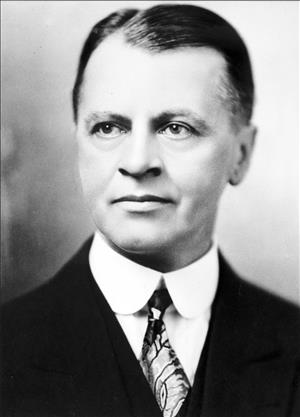On March 9, 1931, Mayor Frank E. Edwards fires Seattle City Light Superintendent James D. "J.D." Ross (1872-1939) for "inefficiency, disloyalty and willful neglect of duty" (Sparks). The announcement comes on the eve of City Council elections and a ballot measure giving City Light control over its own construction projects. The ballot measure passes and pro-City Light council members win election. Mayor Edwards will be recalled from office.
The success and popularity of the publicly owned Seattle City Light placed James Ross in a position of prominence in the debate over public ownership of electric utilities. Private utilities, particularly the Boston conglomerate Stone and Webster, worked openly and secretly to pass laws and elect politicians who would rein in the public utilities. On the local level, City Council members and the mayor often struggled with Ross over costs and technical issues. Design and construction of hydroelectric dams, vital to low-cost power, was in the hands of the Engineering Department.
In January 1931, the Municipal Utilities Protection League, a public power group based in Seattle's North End, proposed a city charter amendment that would move control of hydroelectric construction projects from the Engineering Department to City Light. Proponents claimed the move would save money and opponents claimed it would cost more money. The amendment and City Council elections became a referendum on public vs. private control of public utilities. Despite Ross's influence and leadership in the public power movement, polls showed the measure was doomed to defeat.
The day before the election, Mayor Edwards fired Ross, reportedly on a dare after a party. Edwards had intended that the announcement would come out the next day in The Seattle Times before Ross could respond. But Ross and the Seattle Star learned of the action. The Star ran a special evening edition with a rebuttal by Ross.
The immediate result was passage of the charter amendment and election of three pro-City Light councilmen, Ralph Nichols, Otto Case, and V. C. Webster. The following day, the Municipal Utilities Protection League started a recall campaign against Edwards. Only 24,000 signatures were needed, but 200,000 were collected. A leader of this campaign was League president Marion Zioncheck (1901-1936), a former University of Washington student leader who would later win election to Congress.
Edwards was recalled in a special election on July 13, 1931. Newly appointed Mayor Robert Harlin reinstated J. D. Ross.

